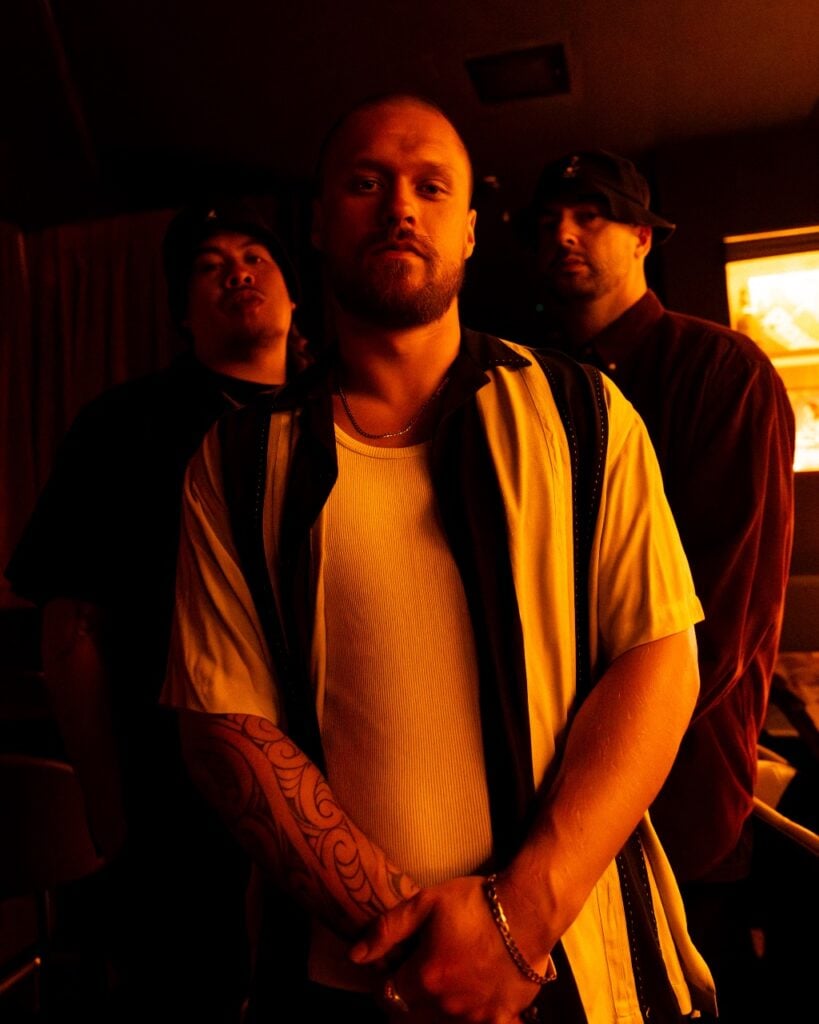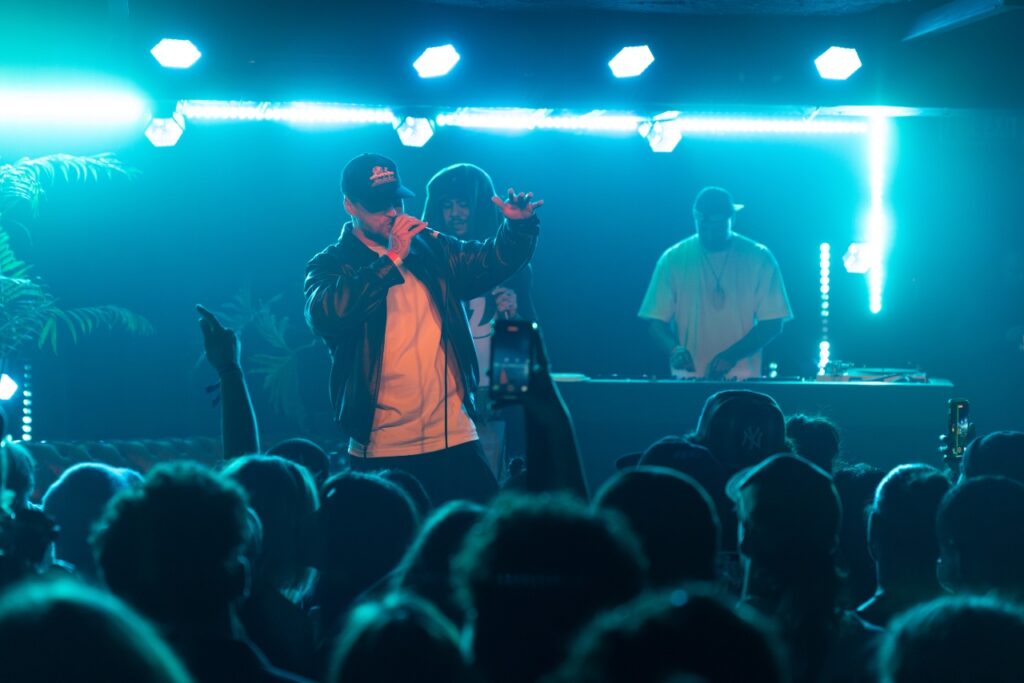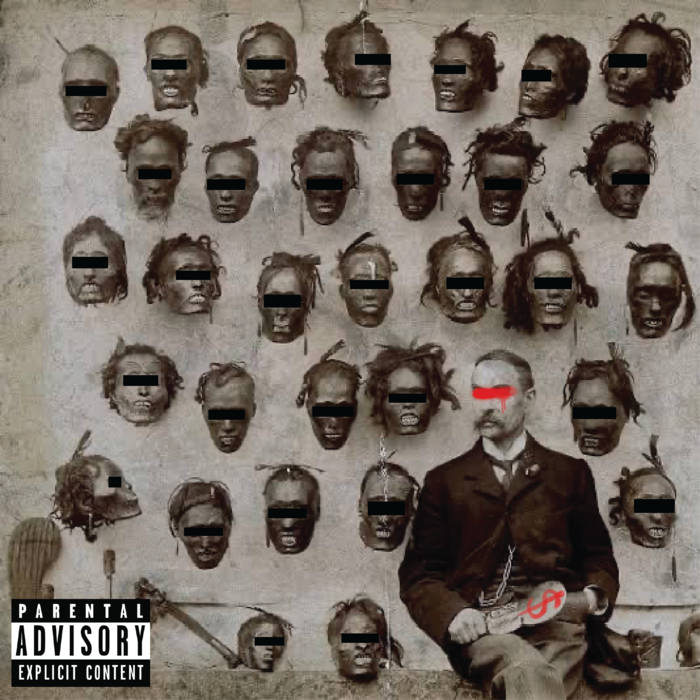Somewhere in Mangawhai, Northland, there’s a family home with an accompanying bach, separated by hedges. Inside that smaller unit, there’s a living room with a television and an Xbox game console, two small bedrooms and a bathroom. If you were to stand in the doorway, you’d find yourself gazing out into a vast, open space framed by fruit trees. It’s one of those places where, even when it’s raining or cold, it feels like summer. Welcome to the winterless north.
Manu, Dusty and Ghos, collectively better known as the new generation Māori hip-hop trio MOKOMOKAI, gathered here to create music together for the first time in early 2021.
“We just went in and built a little makeshift studio,” remembers Dusty, sitting next to me on a couch at his home. Although Manu is the group’s rapper, Dusty often feels like their unofficial spokesperson. With his face framed by tied-back dreadlocks and a backdrop of music and basketball memorabilia behind him, he smiles as he remembers setting up laptop computers, music production hardware, and microphones for a defining recording session. “I’d already had a picture in my mind of doing something like this,” Dusty continues. “I just didn’t know who I was going to do it with until we started talking.”
Over the last four years, MOKOMOKAI have self-released three celebrated albums: MOKOMOKAI (2022), WHAKAREHU (2023), and PONO! (2025), while cultivating a devoted live following up and down Aotearoa.
Throughout their still-growing oeuvre, they’ve mapped out a defined strategy and sound. Unhurried but consistent, they let the hype build online before etching it into wax with immaculately packaged, limited edition vinyl LP pressings that sell out in a matter of days, or sometimes even hours. ”We’re into things people can hold,” Dusty enthuses. “We like selling tickets as well. The rest is background noise.”
Musically, their cornerstone is murky, lower-tempo boombap instrumentals produced by Dusty and Ghos. Infused with the feeling of misty mountains, dense forests, and free-flowing rivers around the motu, as well as cinematic soul, jazz, and lounge motifs, they serve as the perfect backdrop for Manu’s reflective, neo-noir storytelling, punchline-laden rhymes, and in-tune instincts.
Dusty and Ghos’ production often leans eerie, ambient, and foreboding, but it isn’t always that way. Sometimes their instrumentals even sound like a slice of 1950s exotica in the mode of Les Baxter or Martin Denny.
Love Music?
Get your daily dose of everything happening in Australian/New Zealand music and globally.
MOKOMOKAI make love songs as well. When they’re written with Manu’s pen, the starting point is filthy and primal, but ultimately, they’re no less romantic. Admittedly, his lyrical content might make some listeners blush, but when he performs, he taps into something animalistic, even if it’s often left unspoken. I’ve seen how their audiences respond to MOKOMOKAI songs like “JEALOUS”; from the first notes, they’re locked in.
“At the end of the day, I like eating pizza, and I like making pizza,” explains Manu, speaking on a video call from Northland. While he literally does like making pizza and often posts freshly baked pies on his Instagram story, Manu is evoking pizza as a metaphor as well. He’s talking about knowing what you like, honing in on what you like about it, and refining the process. As it turns out, Dusty and Ghos were also partial to pizza, so why not make it together?
The three members of MOKOMOKAI grew up in families with roots up north. They’ve all also spent time in Auckland, particularly Central. These days, Dusty is the only one still posted up in the super city, living on a waterfront peninsula festooned with nīkau palms. Manu’s been tucked away in Northland for a few years, raising a young family and driving back down State Highway 1 when needed. He started rapping as a teenager, while running amok in Grey Lynn and the inner city alongside a set of equally ambitious young artists. “From 17 to 21, I thought this was what I was going to do,” he says. “I thought I was going to be a millionaire off rap. When that faded off, I realised it needed to be a hobby.”
During the late 2010s, Manu continued making music under the alias Dirty at a slower pace, collaborating with the producer and DJ Eno as Eno X Dirty. Together, they released two stylish albums, Evil Adventures & Happy Endings (2017) and Honest to Whom (2019). You can hear the genesis of Manu’s conversational rhyme style on those records, alongside evocations of surrealist imagery, late-night grit, and bulletproof bravado that wouldn’t feel out of place at WrestleMania.
Like a physical embodiment of the “How Often Do You Think About the Roman Empire?” meme, Manu also has a propensity to weave his fascination with classical antiquity into his lyrics. When he isn’t imagining life and death on the Aegean sea, he evokes the exploits of legendary Polynesian explorers like Kupe. Sometimes he compares himself to Hongi Hika, a Māori chief and war leader who, by virtue of a suit of armour gifted to him by King George IV, was invincible on the battlefield for a spell.
Inevitably, Manu returns to the pain he’s felt in himself and the people around him. Through tracks like “WINGS”, featuring the soul/R&B singers Tyra Hammond and Lui, his perspectives on the impact of colonisation, economic pressures, depression, and stress are rendered raw, but never self-pitying. For every hard times song, there’s a feel-good number, often delivered in a colloquial blend of English and te reo Māori that’s been pricking up ears here and abroad. He’s been dropping “kia mau” in his bars lately. It’s a call to hold onto your people, ideas, and purpose firmly.
On Thursday, June 27th, 2024, MOKOMOKAI played their first Wellington show at San Fran on Cuba Street.
As Matariki weekend set in across the nation, Manu strolled the stage with effortless charm and charisma, while Dusty and Ghos held down the music. When their ominous single “ROOFRACKS” (featuring fellow Auckland MC Brandn Shiraz) dropped, the crowd erupted as Manu spat lines like “I’ll get stomped out before I kiss some boots / Been stomped out, didn’t chip a tooth” over a thick bassline, punchy drums, and spare jazz piano chords. Later in the set, Manu gave a friend a video call, so he could witness the energy in the room. It was one of those nights.
By the time MOKOMOKAI started touring New Zealand, Dusty had been immersed in music since his early teens. He came up in the mid-2010s alongside Brandn and a whole flock of leftfield hip-hop and beats misfits in The Grow Room, a D.I.Y. music collective that rented a space inside St. Kevin’s Arcade on Karangahape Road. Lately, he’s been talking to Ghos about the early days, reminiscing on when they’d sit in their rooms with $20 to their names, pulling samples off crackling records to make beats. “It was about chasing the joy, the soul, and the happiness,” he enthuses. Back then, he worked on an Akai MPC, a hardware workstation beloved by his hip-hop production heroes, such as the late J Dilla and Q-Tip of A Tribe Called Quest. He no longer uses that MPC, but it still sits on a pedestal in his living room as a reminder of the past.
Ghos’s passion grew from a similar wellspring to Dusty’s, but his path was slightly different. Growing up in Whangārei and later Hamilton, he would pore over copies of the American hip-hop production magazine Scratch, play basketball, and make rudimentary beat loops on his PlayStation game console with Music 2000. In his early twenties, he left for Australia, where he quietly refined his craft as a producer before returning home a decade later in 2016. Of the three, he’s the most enigmatic. Rarely seen, but always working. “I was on this journey, but I didn’t really know what I was looking for,” he says on a phone call from up north.
Dusty and Ghos first crossed paths online in the mid-2010s through Soundcloud and Instagram. “There was a pocket of emerging producers who were known as the Soundcloud generation,” Dusty continues. “We were part of that.” A year after Ghos arrived back in New Zealand, Dusty released his debut project, the instrumental boombap album I Wanna Live In The Country But The City Said No (2017) under the DUSTYMELODY alias. As Dusty’s profile rose, he began producing for and touring with the Avondale hip-hop artist Melodownz. Like Manu, Dusty eventually had an experience where he started wondering where it was all going. “To be honest, bro, things were a bit of a mess,” he admits. “At times, it was like, ‘What am I doing? Am I working this job, making beats, or being a dad?’ I was just trying to keep my head above water.”
In December 2020, Manu released a song with Eno called “Utu”, which caught his future MOKOMOKAI collaborators’ ears. Although they hadn’t talked about it, all three were captivated by cinematic, crime thriller anthems created by American street rap showstealers like Roc Marciano, Westside Gunn, Boldy James, and the extended Griselda Records crew. When they heard “Utu”, Dusty and Ghos had the same thought: maybe they could make that sort of music with Manu, but with an urban Māori twist. From the jump, it felt natural. “Everything they sent me was something I’d already rap on,” Manu continues. “I always felt like I had raps ready for them.”
As MOKOMOKAI progressed, they began cutting tracks with established New Zealand music figures and friends, including Troy Kingi, Melodownz, Mā, Chip Matthews, Tai Walters, Willie Wes, and Lukan Raisey. Aside from their music tastes and identities, the three friends realised they had a few other things in common: fatherhood, basketball, and vintage mafia movies. “I don’t look at things as coincidences, but I do know that people come into your life,” Ghos continues. “There’s a purpose to how me, Dusty and Manu have come together, especially as Māori. All I can put it down to is the universe is doing its thing, bro. We’re just here to try to channel it in the physical world.”
There’s an elephant in the room with MOKOMOKAI that we haven’t discussed yet, and it all comes back to their group name and the cover of their first album.
I’m going to paraphrase the biography on their Bandcamp page here before we move forward: “In the early 1800s, Māori and Pākehā would trade preserved human heads for goods. This was later to be known as MOKOMOKAI. History varies from one tribal region to another.” On the cover of their debut, the colonial-era British soldier Major General Horatio Gordon Robley (1840-1930) poses with his collection of over thirty heads in a fading, sepia-toned portrait.
“I remember the feeling of the first time I saw that photo,” Manu explains, speaking with a steely intensity. “It says so much, and yet there are still so many questions I have when I look at it.” When Manu first pitched the name and photo to the others, they had some reservations about its tapu (taboo) nature. “Fair enough, you know what I mean?” Manu continues. “For Māori people, it’s a touchy subject. The thing is, those are our heads. Those are our tupuna. They weren’t just the victims; they were selling the heads as well.”
In life, much like art, things are rarely simple or black and white. MOKOMOKAI embrace this complexity. I’ve seen people from every walk of life at their shows. I can’t help but think that they’re able to unify a diverse range of audiences because of their willingness to tackle difficult subject matter head-on.
Their songs find the truth, humour, and solidarity hidden in dark places, and they’re more than willing to sit with the feelings that come with it. When I listen to their music, I think about the ambiguities of history and the weight of the past that leads us to the present moment. Dusty, Ghos and Manu know they haven’t got all the answers, but maybe if we all listened more closely, there wouldn’t be anywhere nearly as much need for questions or answers either.
Pre-orders are now available for PONO! vinyl here.






































